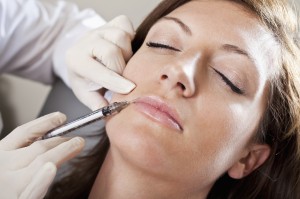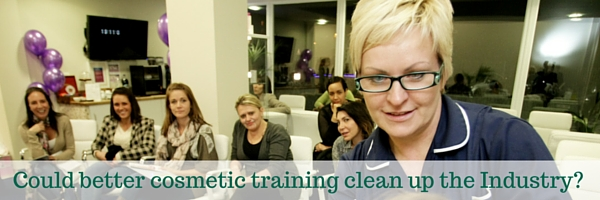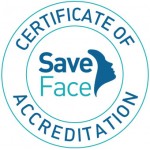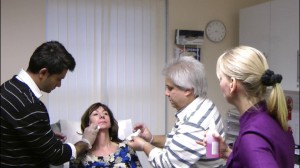Our Leeds clinic is now one of our most popular training locations for Cosmetic Courses. Leeds is a vibrant city and claiming to become the ‘London of the North’. With huge investments being put into the area and convenient travel connections from most UK cities including Sheffield, Manchester and Yorkshire, we knew it would be an ideal training location for our delegates.
With the development of Leeds, there is plenty of demand for new businesses and as a result of this the city has seen a growth in the population of inspiring, dynamic individuals. So with more investment into the city and more money to spend on luxuries, the Northern regions really have become a great place to set up a lucrative aesthetic business.
Our Leeds training facility is based in the skin clinic Skindustry™, which is ideally located in Bingley. There is a direct rail link located less than 1 minute of Skindustry™ Clinic and multiple parking facilities are available. With the growth of this location we are pleased to be able to accommodate many more delegates from other areas such as Scotland, Ireland and Newcastle. Our team will also provide you with useful hotel and travel information to help you plan your stay.
Skindustry Clinic, 113 Main Street, Bingley, West Yorkshire, BD16 2HT
Skindustry™ is a modern, high end skin clinic which is run by an experienced welcoming aesthetic team who can give you all of the support you need. Skindustry™ is a fully functioning skin clinic and CQC regulated, ensuring a professional environment for your training.
Which aesthetic training courses are offered in Leeds?
- At Cosmetic Courses we understand the busy schedules of our delegates and pride ourselves in being as flexible as possible to accommodate all training needs. We currently offer a variety of training courses in our Leeds location including our Foundation Botox and Dermal Filler courses, which we currently offer once a month. We also offer 1-2-1 training days for Botox and Dermal Filler, which can be either a full day or a half day and can range from basic to advanced level to suit all abilities.
- Another popular course we offer is the Non-Surgical Facelift (also known as the 8 Point Facelift) training, a brilliant alternative to surgery that will subtly reshape and redefine the face.
- Due to popular demand over the last year we have extended our course offering in our Leeds location. Our training repertoire now includes the ever growing skin rejuvenation treatments such as Chemical Peels and Dermaroller. These procedures can often seem more appealing to patients who are new to the world of aesthetics as they are less invasive than Botox and Fillers. Many people interested in non-surgical treatments are now opting for chemical peels as an introduction or as an added benefit to their current treatment plan, depicting a growth in demand for skin rejuvenation. Therefore, it is an excellent way to tempt clients into the world of non-surgical treatments.
- Another popular course we are offering at Leeds is Platelet Rich Plasma Training, which is becoming increasingly popular due to the fact there is no use of artificial products; it is a popular treatment not only on it’s own, but it also compliments other treatments such as dermal fillers or the dermaroller.
Which ever stage you are at in your training, there should be something for you at our aesthetic training location in Leeds.
Due to the quality of teaching, and expertise of our trainers Pauline Walton and Nick, we are proud to say that the popularity of our training in Leeds has grown year on year. With the introduction of new courses and additional training dates, we’ve seen a substantial growth of 265% from 2015 to 2016! Our model database for Leeds has also grown significantly, showing the increasing demand for non-surgical cosmetic treatments in the area.
If you have any further questions on our Leeds location, would like to book a course or become a model; please feel free to contact the team on 01844 390 110 or send us an e-mail at [email protected]
 It’s that time of the year again. A time for reflecting on the year that’s passed, and looking forward to what the new year might bring. And for us at
It’s that time of the year again. A time for reflecting on the year that’s passed, and looking forward to what the new year might bring. And for us at 
 Unfortunately, lax rules have created conditions where unqualified, unscrupulous practitioners have been allowed to flourish.
Unfortunately, lax rules have created conditions where unqualified, unscrupulous practitioners have been allowed to flourish. Accreditation is voluntary, so by seeking it out you’re sending a powerful message to your patients, and by extension, the industry. The bare minimum is not enough.
Accreditation is voluntary, so by seeking it out you’re sending a powerful message to your patients, and by extension, the industry. The bare minimum is not enough.







